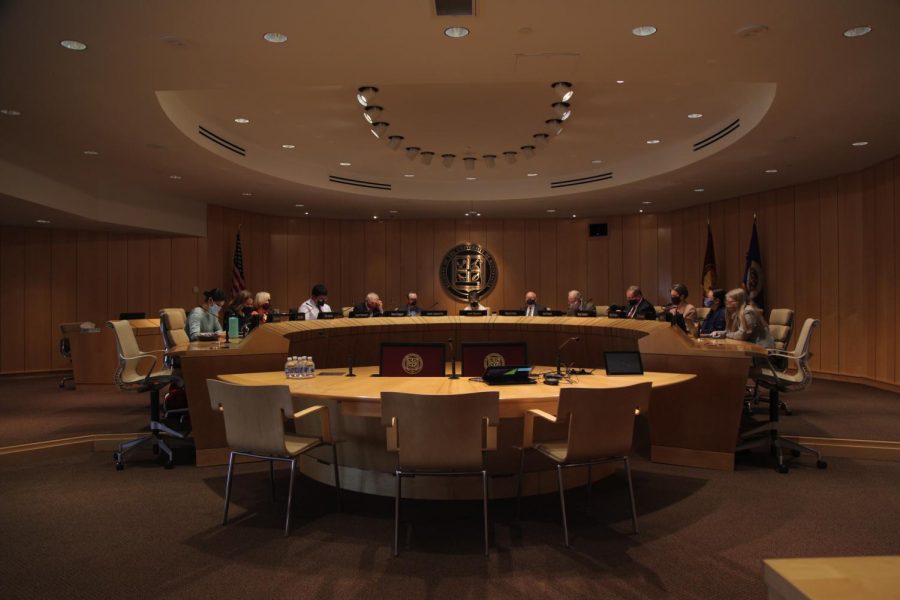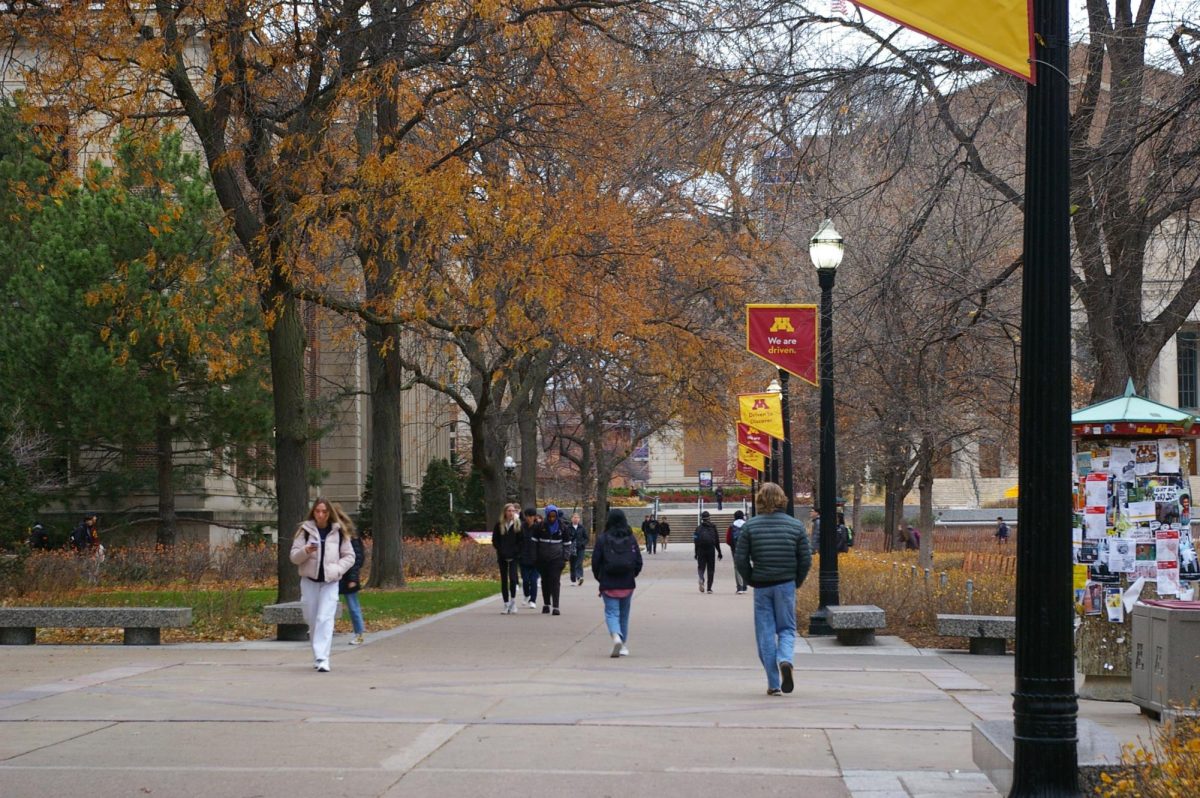The University of Minnesota Board of Regents approved former regent David McMillan as the two-year interim chancellor for the University of Minnesota-Duluth (UMD) campus at their meeting on Wednesday.
The board also talked about President Joan Gabel’s performance bonus pay and the University’s campus safety plan heading into the upcoming academic year.
McMillan as the interim chancellor for UMD
Despite the recent controversy surrounding McMillan’s application for interim chancellor, the regents approved McMillan for the position in a 9-2 vote after the search committee presented him as its recommendation. Regents Darrin Rosha and James Farnsworth were the two regents to oppose McMillan’s appointment.
Before the board voted, Gabel said at the meeting the allegations made against her and McMillan are inaccurate, “hurtful” and “cause reckless damage.”
On Tuesday, the board received a letter from Minnesota state representatives and senators. The letter stated the board should be careful about how they approach the decision with McMillan, Regent Steve Sviggum said at the meeting.
Sviggum said it was “wrong” for the legislators to send the board a letter because it was based on “baseless allegations.” He said the University “has so much to be proud of” and these allegations put them “down in the muck.”
“There has been no quid pro quo,” Gabel said. “I have always acted in the University’s best interest.”
Gabel recused herself from the candidate selection process in June and also left the meeting on Wednesday when the board discussed the search committee’s recommendation and voted.
Several members of the board, including Regent Mary Davenport, said at the meeting McMillan is qualified and the right person for this position.
Board Chair Ken Powell said at the meeting the board was not able to disclose who the other candidates for the position were due to protecting private personnel data. He said it was “grossly unfair to suggest that following privacy laws is suspicious.”
Regent Mike Kenyanya said at the meeting he trusted the search committee’s recommendation, even though the committee’s original search was deemed a failed search. He said “search committees do fail” sometimes.
Regent Kodi Verhelen added to Kenyanya’s statement, and said at the meeting, “unusual doesn’t mean that it’s wrong.”
Multiple regents brought up the media and how it played a role in the controversy. Regent Janie Mayeron said at the meeting the media have made “baseless allegations by a variety of people who do not have the facts in front of them.” She said the “baseless claims” are what is ruining the public’s trust, not the board itself.
At the meeting, Rosha said this issue is not about McMillan, it is about the board’s possibly unethical actions.
Farnsworth said at the meeting if there is a potential conflict of interest or an appearance of a conflict of interest choosing McMillan for this position, the board should wait to make a decision to protect public trust in the board and the University.
Prior to the vote to approve McMillan, Rosha proposed a motion for the board to wait to vote until an outside party could conduct a legal review to determine if appointing McMillan has an appearance of a conflict of interest. The board voted 9-2 against the motion.
Rosha then moved to change the two-year term for the interim position to a six-month contract, after which it would be a month-by-month appointment. The board voted 9-2 against the motion before voting to approve McMillan as the two-year interim chancellor.
The board voted 9-2 to award McMillan a $250,000 annual salary, which is the same starting salary as a first-year chancellor in the University system. He will also receive an additional $25,000 housing allowance annually, which chancellors typically receive, Powell said.
The $250,000 salary is below the current comparable market value for a chancellor position, according to the Annual Workforce & Human Resources Strategy Report.
“In concert with then-regent McMillan’s statement to me that this was just about helping the institution, I felt that we might be more aggressive in being able to provide this leadership at a lower value,” Rosha said. “I do appreciate it’s lower than these other amounts, but for most Minnesotans, this is a very substantial salary.”
These monetary provisions will go to McMillan for his approval along with the full contract. The contract will go back to the board for negotiations if McMillan does not approve it.
The contract was not available prior to the meeting because of “significant controversies that were going on and responses that we had to make,” Sviggum said.
Determining Gabel’s performance pay
Powell announced to the rest of the board that Gabel will receive a $50,000 performance pay bonus, a decision the chair now makes without approval from the other regents and after consultation with the Presidential Performance Review Committee, according to language in Gabel’s 2021 contract. Powell said the committee unanimously agreed to award Gabel the $50,000 bonus.
“Feedback on President Gabel’s performance was overwhelmingly positive,” Powell said. “We believe the University of Minnesota is benefitting greatly from President Gabel’s leadership.”
Mayeron motioned to ratify that the board supports the chair deciding Gabel’s performance pay amount so they can give reassurance to the University community after some community members raised questions about the chair’s sole authority to do this.
Rosha motioned for an amendment to change the 2021 contract’s language to reflect that all regents have a say in Gabel’s performance pay as well as her goals, metrics and objectives.
After multiple regents brought up concerns about not being prepared to vote on both Mayeron’s motion and Rosha’s amendment, both regents withdrew their motions for the board to possibly discuss the issues at a later date.
MSafe public safety planning for the 2022-23 academic year
Myron Frans, the senior vice president for finance and operations, discussed the University’s plans for campus safety for the upcoming school year.
After investing more than $60 million in safety actions for the past two years, Frans said the University is going to keep pushing for more resources because “safety is a top priority.”
There are several new goals for campus and public safety next year, including having more police officers on patrol, improved lighting around campus and sending SAFE-U alerts out faster for students.
Matt Clark, UMPD Police Chief, said he understands that getting more police officers may be difficult, but UMPD is doing everything they can.
“It’s the primary goal to make sure that crime is down,” Clark said.
Approving the Universal Transit Pass
The board approved the Universal Transit Pass for fall semester for all University students who pay the transportation and safety fee.
In March, the Minnesota Student Association pushed for the Universal Transit Pass and met with administrators. The pass allows University students to ride the Metro Transit light rail and buses for free with their U Card.
Gabel said she is excited for the pass to be given to students and that it was a great accomplishment for the University.



















